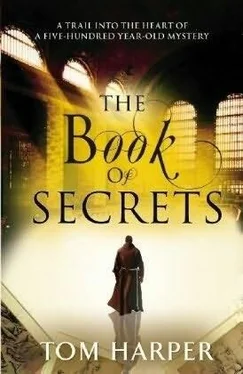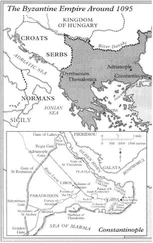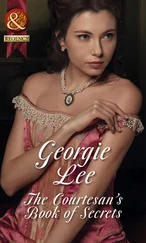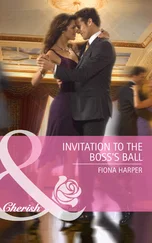Drach took the plate out of a felt bag and rubbed it clean with a cloth. He laid it on the end of the table and poured a pool of black ink onto it from one of the jars. He spread it with the flat of a birch-wood blade until all the copper was black, then scraped it away again with the sharp edge. Finally, he wiped the plate with a stiff cheesecloth. I marvelled at his touch. He could be so careless of some things, often gratuitously rough-handed, but he could also work with the most exquisite precision when he wanted. The cloth bloomed black as it soaked up the ink from the polished surface, yet in the incisions – only a few hairs’ breadths deep – the ink remained untouched.
Drach arranged the plate on the stone bed of the press. I dampened a leaf of paper with a sponge and passed it to him. He laid it over the plate and stepped away.
Hand over hand, Saspach and Dunne turned the bar that drove the screw. It squeaked in its grooves. The wooden platen touched the paper and squeezed. I heard a tiny liquid belch – probably the water I had used to moisten the paper, but in my mind it was the sound of ink being drawn out of the copper into the paper.
Saspach and Dunne screwed down the platen as far as it would go, then spun back the lever to loose it. I stared at the paper, imagining I saw faint shadows on the underside. Drach peeled it away from the copper plate and raised it to show us. I held my breath.
It was hideous. In stark black and white, letters that had looked neat and regular in the engraving were now as wild as a child’s hand. On some of the words the ink had come out thin as cobwebs, on others, thick and heavy as tar. I wanted to weep, but with the other three men looking on I did not dare.
‘Why has this happened?’
‘Copper is like human flesh. The deeper the cut, the more the bleeding.’ Drach traced his finger over a particularly obese A.
‘But your cards – every line was perfect.’ I knew I sounded like a petty child consumed by jealousy. That was how I felt.
‘Yes.’ Drach stroked his chin and affected to contemplate the paper. ‘These are not as good.’
‘It is easier to cut a long line than a short one,’ said Dunne. He had engraved some of the text himself and had to defend himself. ‘Each letter requires so many fine cuts it is inevitable some go too deep or shallow.’
‘Inevitable in the wrong hands,’ Drach muttered.
I pointed to a U, so deformed it looked like a B. ‘And that?’
‘The shape of the letters allows no room for error,’ said Dunne. ‘Any fool can make a picture. Change the shape of a deer’s antler and it is still a deer. Change the shape of an A and it is meaningless. I think perhaps Drach’s art is not suited to this purpose.’
‘Perhaps you are not suited to this purpose,’ said Kaspar. ‘Perhaps the next one will be better.’ Saspach tried to broker peace. His face showed none of the despair I felt, only irritation. For him, this was merely a job that had wasted his talents.
We repeated the procedure. When it was done, Drach took the paper from the press and laid it on a bench beside the first. We leaned over to examine them.
‘The same,’ grunted Dunne. He turned away in disgust. Yet I kept looking. Where he saw confirmation of our failure, I saw a spark of hope. They were the same. The same erratic script, the same malformed letters and drunken lines, the same place on the third sentence where miserere was misspelt misere. In their manifest imperfections, at least, they were perfect copies.
‘The process is fine,’ Drach declared. He thrived on perversity. ‘All we need is to improve it.’
Paris
A freezing wind whistled down the Seine. On an embankment above the river, four L-shaped towers jutted towards the grey sky. The architect had meant them to look like open books stood on end, but to Emily they looked more like the corners of a vast glass castle. Except there was no castle to be seen. The space between the towers – a slab of ground the size of several football fields – was empty. It was only when you looked down that you saw the inside-out heart of the complex: a glass pit, a deep rectangle dug sixty feet into the earth, with the different floors of the library looking out over a sunken courtyard. And instead of a castle in the forest, a forest in the castle, for the courtyard was filled with trees, so deep that their uppermost branches only just reached to ground level. It was like no other library Emily had ever seen.
The trees began to rise above her as she rode an outside escalator into the pit. It brought her halfway down, to a mezzanine level where a bored guard gave her bag a perfunctory search. It was warm inside: a plush atmosphere of red carpets and polished wood, like a theatre foyer. Even the computers were housed in wooden cabinets. Emily crossed to one and laid Gillian’s card on a flat metal scanner. An onscreen message in French welcomed Gillian Lockhart. Emily looked at the trail of cables snaking out of the computer into a duct in the floor, and wondered how far those tentacles stretched, which corners of the electronic world had just been alerted to the fact that Gillian Lockhart had apparently reappeared at the Bibliothèque Nationale.
Emily tapped a fingernail on the touchscreen. A list appeared:
Lost Books of the Bible
Studies on the Physiologus in the Middle Ages
Physiologus (Anonyme, XVème Siècle)
She frowned. A physiologus was a bestiary, a collection of fables masquerading as zoology. She’d studied plenty for her work on medieval animal motifs. Why had Gillian consulted them? Had she found something to do with the animals on the playing cards?
She tapped the screen again to order the books down from the towers where they were kept.
Merci, Gillian Lockhart
A twinge of discomfort ran up Emily’s back. She didn’t like being Gillian Lockhart. They’d never met, but Gillian had lurked in the Cloisters like a ghost brought over with the medieval stones, a name guaranteed to change the subject. All museums have their mysteries, and Emily – fresh from her doctorate, eager to please, her own secrets to hide – had let it lie. She wondered if Nick knew. There was something desperately innocent about the way he’d plunged headlong into the search for Gillian, a knight errant come to rescue his damsel. Emily had read enough medieval romances to know that women who drew knights onto quests weren’t always what they seemed.
The books would come to the reading room on the court yard level. She checked her bag into the cloakroom, then walked to the row of turnstiles and pressed the card against another reader. The barrier opened and she stepped through, trying not to shiver at the bar’s cold touch through her stockings.
*
GILLIAN LOCKHART

is in mortal peril
(last updated 02 January 11:54:56)
In an Internet café on the rue St Georges, Nick sighed. There had always been aspects of Gillian that remained a mystery to him. The way she would spread peanut butter on hamburgers. The way she sometimes turned off her phone and didn’t come home at night. When he’d dared to ask if she was seeing someone else, she’d accused him of having no imagination and locked herself in the bedroom.
Why had she written ‘mortal peril’? If she’d been in real danger she’d have called the police, or run, not logged on to the Web to update her profile. Unless it was a last gesture of defiance, a joke to belittle what was coming. That would fit.
Next to her name was a thumbnail photograph – different to the one on the library card. This was an older picture, Gillian with long black hair combed in a straight fringe, with panda-bear eyes like an art student.
Читать дальше













